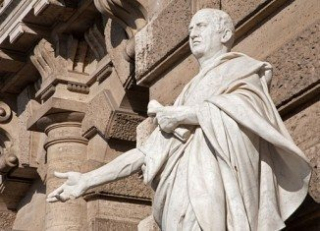What is a demagogue?
When I was taking Ancient History A Level, back in 1972, what went wrong with the history of Athens in the fifth century BC (and what led to the defeat of Athensin the Peloponnesian War) was fairly straightforward. A new class of politicians arose. Gone were the wise counsels of the likes of Pericles. Instead there was a new breed of demagogues, such as Kleon and Kleophon. The men stirred up the people with false promises, manipulating the basest of popular instincts by a showy rhetoric, and so ensuring that the popular assembly voted for superficially attractive proposals that in the medium term proved disastrous.
Much the same, we learnt, went on in Rome in the first century BC. On the one hand, you had the sensible Cicero (even if it was hard not to think him rather pompous). On the other, there was the disreputable Clodius, speaking weasel words to the people, bribing them with free handouts, all in the pursuit of personal power.
It was only when I got to university that I was taught that there might be another side to this. The basic reason that we think that Pericles is such a model is that we have come to see the period so heavily through the eyes of Thucydides -- who had no doubt that Pericles was just what Athens needed (Thucydides' political sympathies were moderate oligarchy, and he had no qualms about supporting a leader whose career could be seen as about as close to elected dictatorship you could get under a radical democracy). There was another side to this. For a start, the attacks of the new breed of politicians were partly snobbish. It may have been satire for Aristophanes to brand them "sausage-sellers" and the like. But it seems fairly clear that they were of "newer money" than the blue-blooded Pericles. And besides, the closer you looked at Pericles' relationship with (and manipulation of) the Athenian people, the less difference there seemed between him and Kleon. "Was Pericles a demagogue?" was a standard essay topic. The answer usually a guarded yes.
And you could do a similar reconstruction job on Clodius if you started to peel away the Ciceronian prejudice (and Cicero, directly or indirectly, is almost our only source). From one point of view, Clodius may have been bribing the people with free handouts. From another, you could see free grain as an effective form of poor relief, advocated by a politician who actually noticed to needs of those less well off than himself.
The word "demagogue" ("leader of the people") was, in short, a dangerous term of political analysis, a slur usually in the ancient world thrown at a powerful speaker with whom you disagreed. Or, in one of Ambrose Bierce's subversive definitions, "demagogue n, a political opponent".
But there is more to it than that. If, in relation to the ancient world, accepting accusations of demagoguery is lazy history, in the modern world it is dangerously lazy politics. I am getting increasing fed up with the word being thrown at Trump or Farage or whoever, as if that was enough, that was all that needed to be said. Once you have agreed they are "demagogues", you don't have to carefully unpick their arguments, you can just take it for granted they are wrong (as "demagogues" by definition are).
Now, by the time you read this, the Trump campaign may have imploded. But if it hasnt, I hope his opponents will concentrate more on his substance than on his style. For what is truly alarming is that there is substance there -- and it is that whose faults, illogicalities and misprisions need to be starkly exposed.
(I had further, and other, thoughts in this area in an article in the Cheltenham Literary Festival souvenir number of the TLS, a special free issue available at the festival...do pick one up if you are there.)
Mary Beard's Blog
- Mary Beard's profile
- 4110 followers




